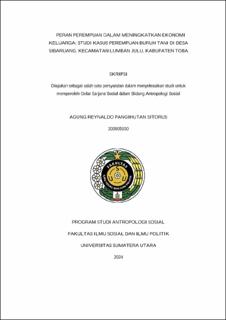| dc.description.abstract | This study aims to understand the role of female farm laborers in improving family economics in Sibaruang Village, Lumban Julu District, Toba Regency. A qualitative research method with a phenomenological approach was used, allowing for an in-depth exploration of the experiences and perspectives of these women regarding their contributions to family income. The research location was selected due to the availability of relevant data on the roles and factors influencing women to work as farm laborers.
Informants were selected purposively and included key informants (landowners), primary informants (female farm laborers who are also housewives), and additional informants (husbands of the female farm laborers). Data collection methods included library research, participant observation, in-depth interviews, and documentation. The interactive model by Miles and Huberman was used for data analysis, involving data collection, reduction, presentation, and conclusion drawing.
Findings reveal that female farm laborers play a crucial role in enhancing family income. They not only work in the fields to earn additional income but also manage household responsibilities. This dual role significantly contributes to meeting daily needs, children's education expenses, and savings for emergencies. These women exhibit resilience and dedication in balancing their roles as homemakers and breadwinners.
The study also highlights the importance of women's education and health in their ability to contribute effectively to family economics. Improved education enables women to secure better employment and increase family income. Therefore, the study recommends policies that support women's education and health, and protect their workplace rights.
This research provides valuable insights into the economic contributions of female farm laborers in rural areas. The findings are expected to guide further research and inform policies that support the role of women in the agricultural sector and rural economy, enhancing family welfare in villages like Sibaruang. | en_US |


